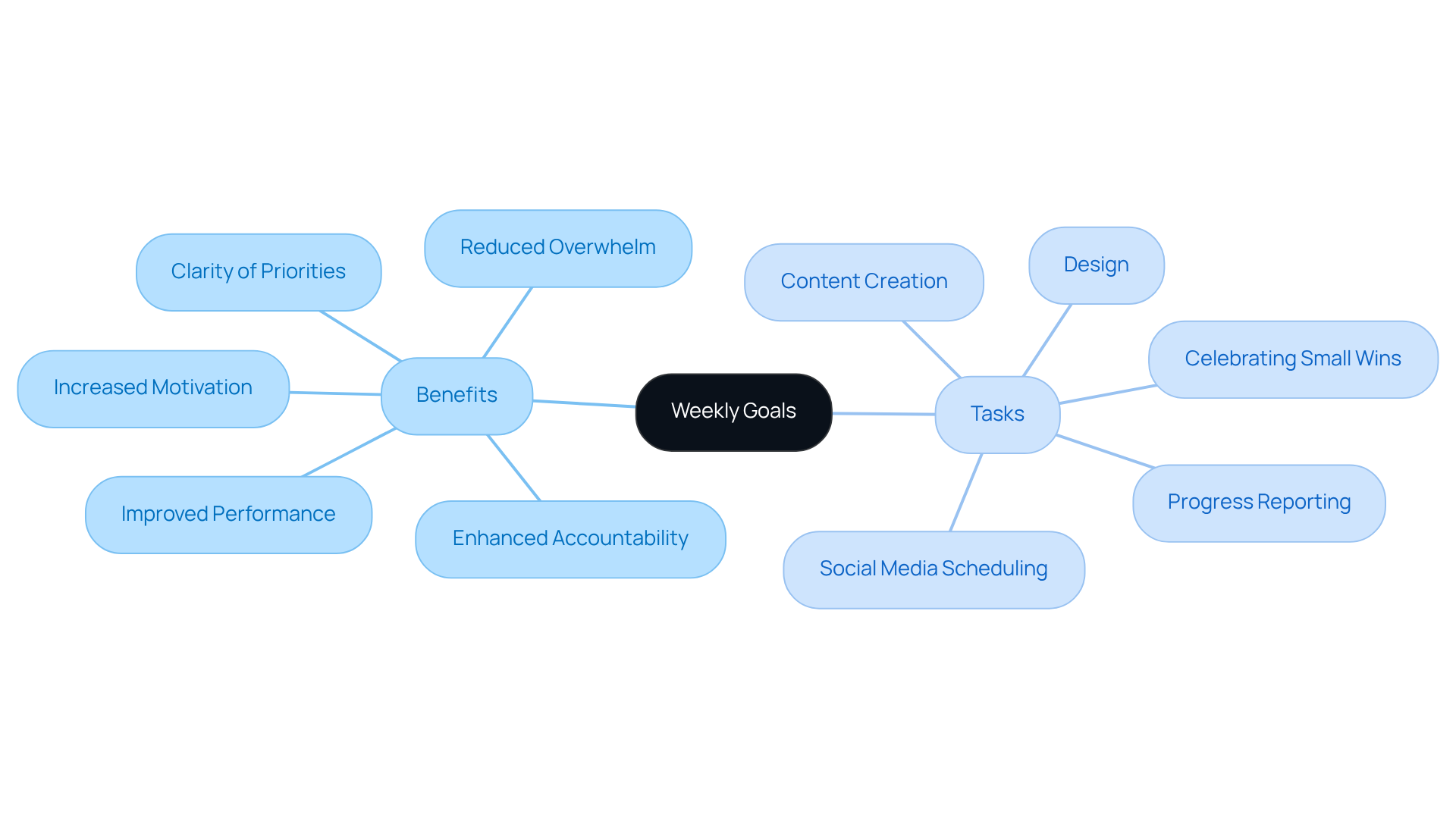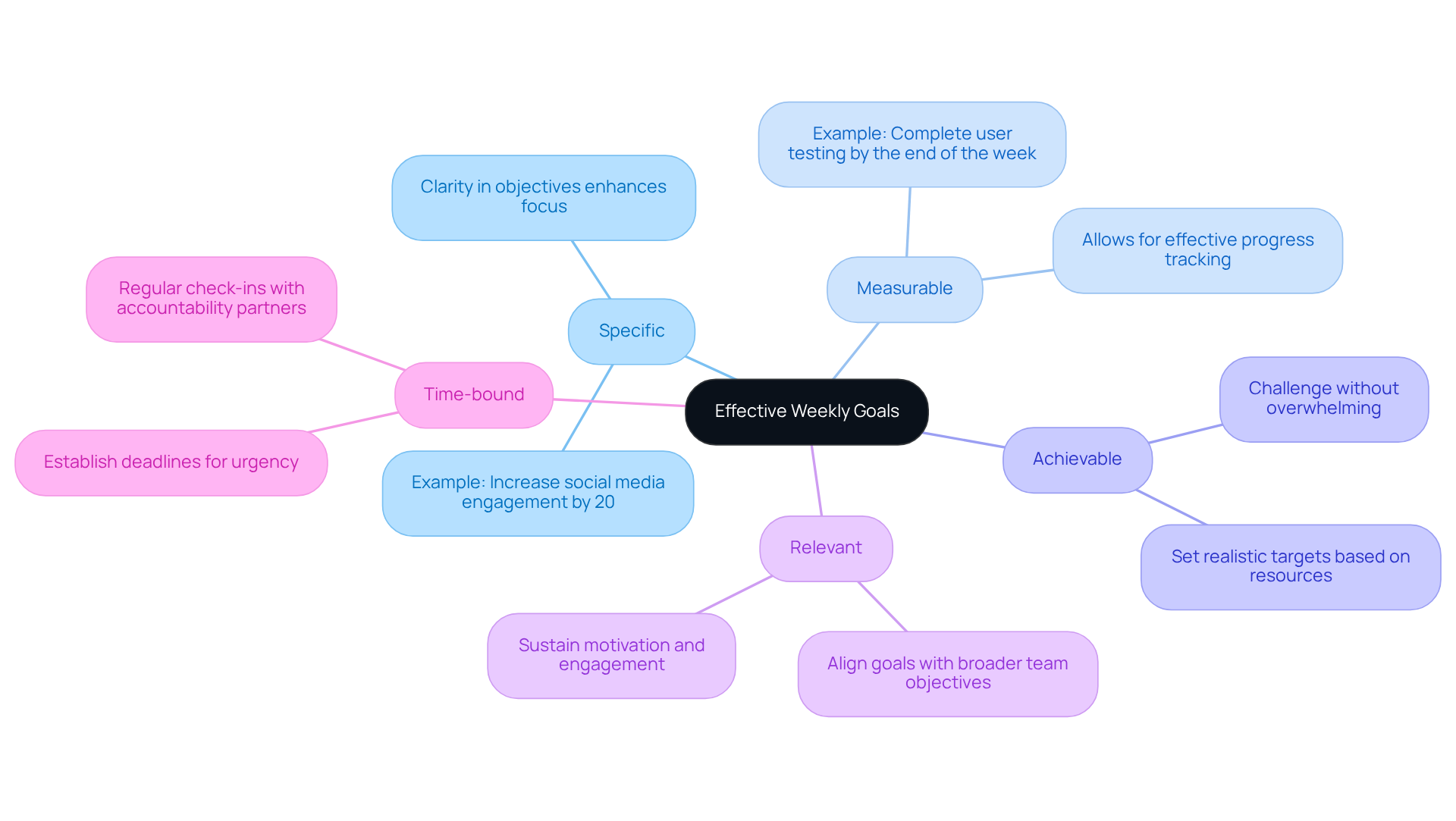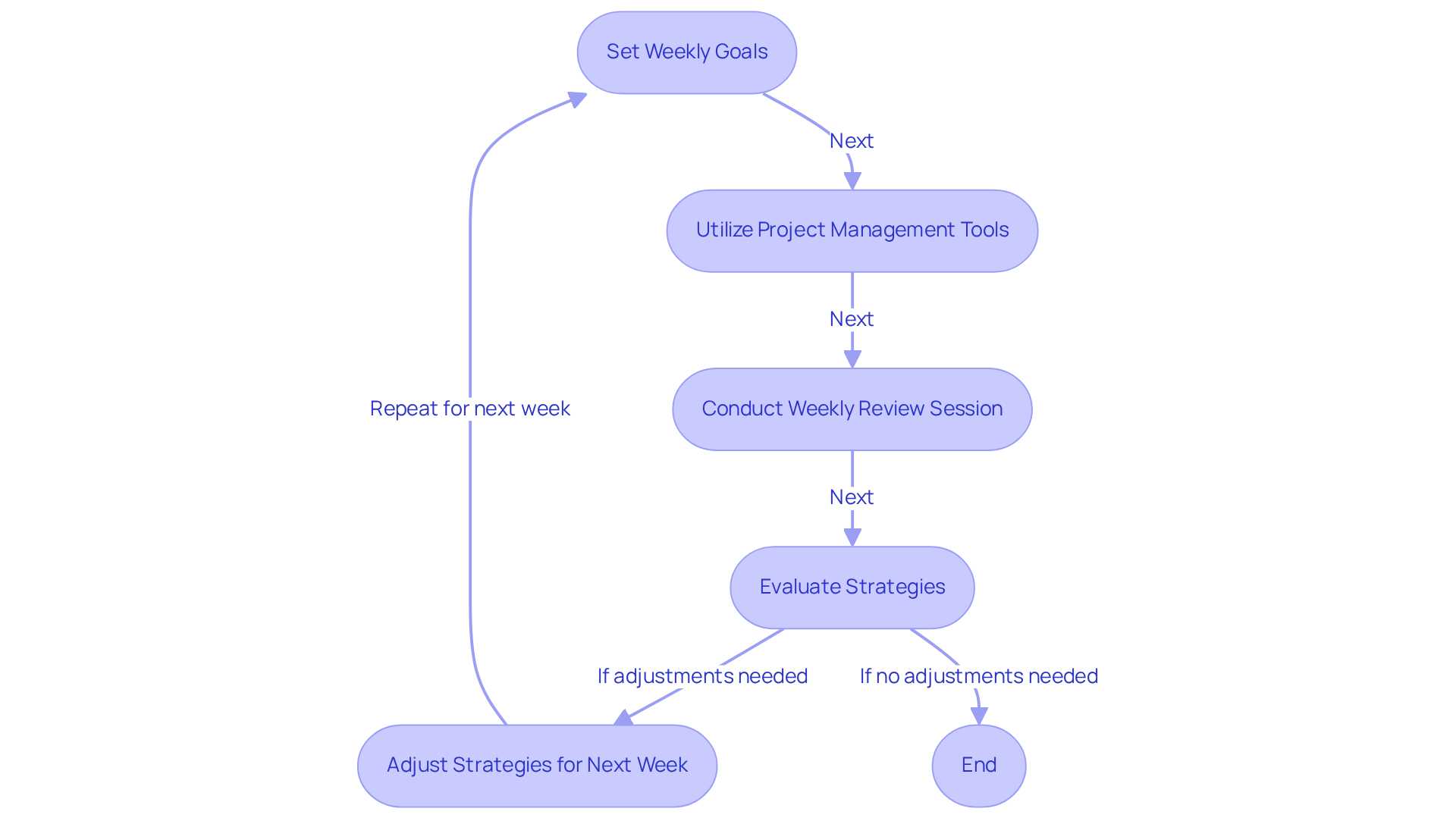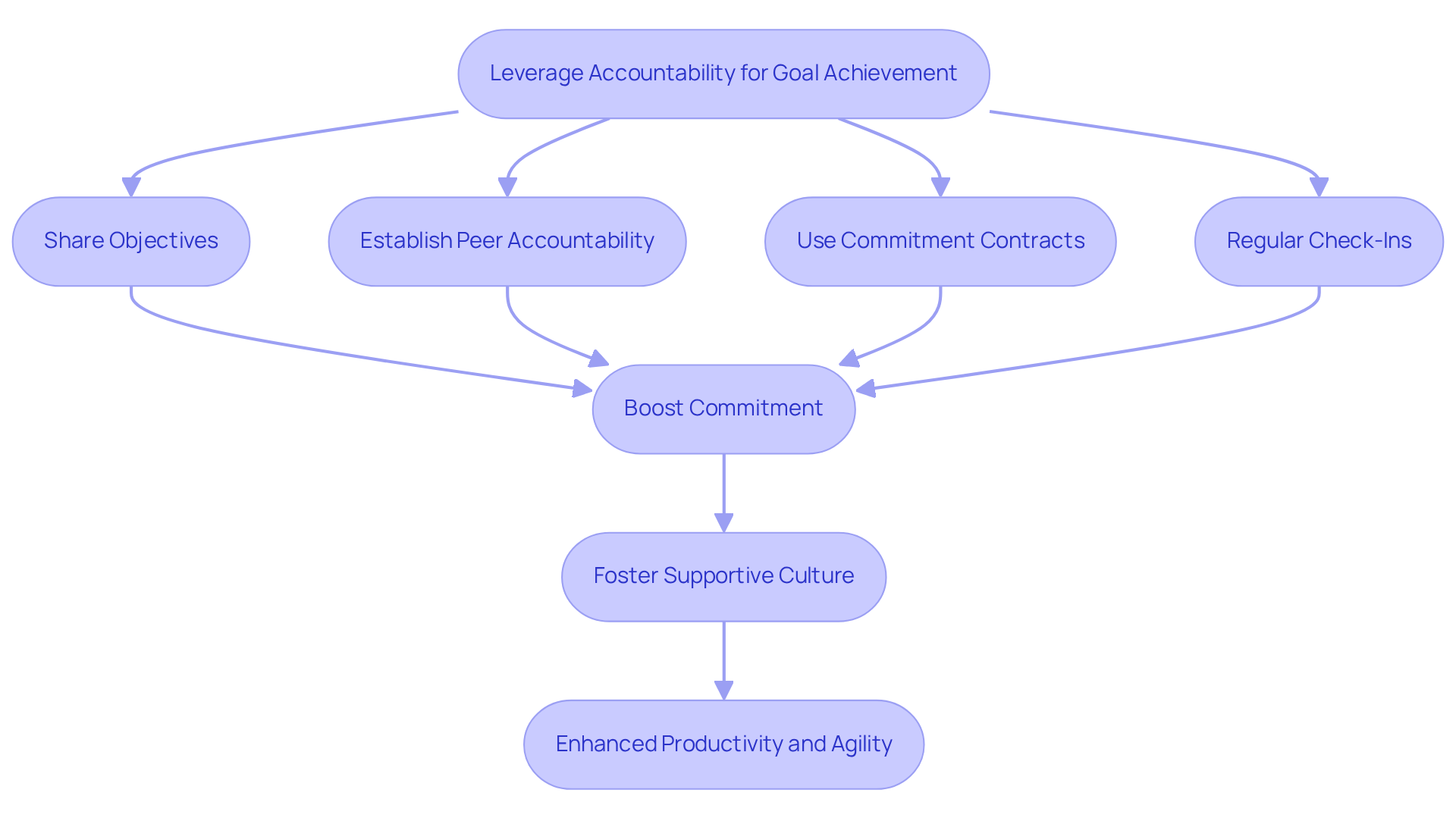Overview
This article presents four effective strategies for achieving weekly goals, designed to enhance productivity and goal attainment within teams.
-
It emphasizes the importance of setting specific and measurable objectives by employing the SMART criteria. How clear are your objectives? By defining clear goals, teams can better focus their efforts.
-
Next, tracking progress regularly is crucial. Regular evaluations not only keep teams accountable but also allow for timely adjustments. Are you monitoring your progress effectively?
-
Furthermore, leveraging accountability among team members fosters a supportive environment. When team members hold each other accountable, it cultivates a culture of collaboration and commitment.
-
Finally, the article underscores the significance of clarity, routine evaluations, and peer support. These practices collectively demonstrate that implementing these strategies can significantly enhance team performance and success.
Introduction
Establishing weekly goals can be the secret ingredient to transforming overwhelming projects into manageable tasks, fostering both accountability and motivation within teams. By breaking down larger objectives into clear, actionable steps, individuals can significantly enhance their productivity and focus on what truly matters. However, the challenge often lies in how to effectively set and track these goals to ensure success. What strategies can be employed to not only define these objectives but also maintain momentum and accountability throughout the week?
Understand the Importance of Weekly Goals
Weekly goals function as a strategic roadmap, allowing larger projects to be broken down into manageable tasks. By clearly defining weekly goals, groups cultivate a structured approach that enhances both accountability and motivation. This practice not only clarifies priorities but also optimizes resource distribution, ensuring members focus on high-impact activities. For instance, a marketing group may set a weekly target to initiate a campaign, subsequently outlining specific tasks such as:
- Content creation
- Design
- Social media scheduling
This clarity mitigates overwhelm and miscommunication, propelling productivity forward.
Consider this: studies reveal that individuals who establish objectives are 43% more likely to accomplish them. Furthermore, those who articulate their aims in writing are 1.2 to 1.4 times more likely to succeed. Additionally, celebrating small wins reinforces positive habits and boosts motivation, sustaining momentum. By establishing weekly goals and involving accountability partners, teams can effectively monitor progress and adjust strategies as necessary, ultimately leading to improved performance and project success.

Set Effective Weekly Goals Using SMART Criteria
To maximize the effectiveness of your weekly goals, applying the SMART criteria is essential. Begin by defining your objectives with precision; for instance, rather than simply stating 'improve marketing,' articulate it as 'increase social media engagement by 20%.' Research indicates that establishing clear objectives enhances the likelihood of success 90% of the time, underscoring the importance of clarity in maintaining focus and direction.
Next, ensure your weekly goals are Measurable, allowing for effective progress tracking. For example, a team responsible for product development might set their weekly goals to complete user testing by the end of the week, providing a clear metric for success. Additionally, goals should be Achievable; set targets that challenge yet remain realistic based on available resources. Relevance is crucial—align your goals with broader team objectives to sustain motivation and engagement.
Furthermore, consider partnering with someone who can regularly check on your progress and offer support. Finally, establish a time frame for your weekly goals; setting deadlines creates urgency and accountability. Remember, celebrating achievements along the way is vital for maintaining motivation and morale. By integrating these SMART principles, teams can enhance productivity and ensure their efforts are aligned with overarching goals.

Track and Review Your Progress Regularly
Establishing a routine for tracking progress toward achieving weekly goals is crucial for success. Have you considered how utilizing project management tools like Casy can automate updates and reminders? This keeps you consistently informed about your status. Arranging a weekly review session focused on weekly goals enables groups to evaluate achievements, recognize deficiencies, and comprehend the reasons for them. For instance, if an objective to boost website traffic was not achieved, the group can assess the strategies used and modify their approach for the upcoming week. This iterative process fosters a culture of accountability and encourages continuous learning, which is essential in startup environments.
Statistics indicate that organizations utilizing management software report a 52% enhancement in collaboration. This emphasizes the efficiency of these tools in improving objective tracking. Moreover, 73% of organizations utilizing formal project management commonly achieve their objectives. This suggests that high-performing groups regularly perform progress evaluations, which are associated with improved project results. By incorporating regular evaluations into your workflow, you can significantly enhance group performance and ensure alignment with your objectives.

Leverage Accountability for Goal Achievement
Integrate responsibility into your goal-setting approach by sharing your objectives with colleagues or stakeholders. This can be achieved through regular check-ins or progress updates, fostering a sense of responsibility.
Have you considered establishing peer accountability systems, where group members assist one another in reaching their objectives? For example, a game development group might pair up to review each other's progress on tasks, providing feedback and encouragement. Tools like commitment contracts or apps such as StickK can facilitate this process, allowing individuals to formally commit to their goals. This collaborative method not only boosts commitment but also fosters a supportive group culture—vital for addressing the challenges of startup life.
Research from the Association for Talent Development indicates that individuals are significantly more likely to achieve their goals—up to 95%—when they have scheduled check-in meetings. However, it is crucial to acknowledge that minimal responsibility can result in mistrust and diminished morale among groups.
By fostering an environment where team members hold each other accountable and leaders model accountability through transparency and recognition, startups can enhance productivity and agility, ultimately driving success.

Conclusion
Establishing effective weekly goals is crucial for driving productivity and ensuring that larger projects are broken down into manageable tasks. By implementing structured goal-setting practices, teams can enhance accountability, motivation, and overall performance. This approach not only clarifies priorities but also fosters a culture of continuous improvement, ultimately leading to greater success in achieving objectives.
Key strategies include:
- The importance of using the SMART criteria to define clear, measurable, and achievable goals.
- Regular tracking and review of progress are vital for identifying successes and areas for improvement.
- Leveraging accountability through peer support can significantly increase the likelihood of goal attainment.
These practices create a supportive environment where individuals feel motivated to reach their targets.
In summary, the significance of weekly goal setting cannot be overstated. By adopting these strategies and fostering a culture of accountability, teams are better equipped to navigate challenges and achieve their objectives. Embracing these practices enhances productivity and cultivates a motivated workforce ready to tackle any project with confidence and clarity.
Frequently Asked Questions
What is the purpose of setting weekly goals?
Weekly goals serve as a strategic roadmap, breaking down larger projects into manageable tasks, enhancing accountability and motivation, clarifying priorities, and optimizing resource distribution.
How do weekly goals benefit group dynamics?
By clearly defining weekly goals, groups cultivate a structured approach that reduces overwhelm and miscommunication, which in turn boosts productivity.
Can you provide an example of tasks that might be included in weekly goals?
An example of tasks for a marketing group might include content creation, design, and social media scheduling as part of a weekly target to initiate a campaign.
What is the impact of setting objectives on success rates?
Studies show that individuals who establish objectives are 43% more likely to accomplish them, and those who write down their aims are 1.2 to 1.4 times more likely to succeed.
Why is celebrating small wins important?
Celebrating small wins reinforces positive habits and boosts motivation, helping to sustain momentum towards achieving larger goals.
How can accountability partners enhance the process of achieving weekly goals?
Involving accountability partners allows teams to effectively monitor progress and adjust strategies as necessary, ultimately leading to improved performance and project success.




